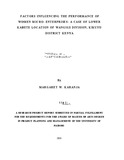| dc.description.abstract | In spite of a variety of researches' in Lower Kabete location, very few had paid close attention. To the factors Influencing sustainability of women founded micro enterprise in the area. For example one by Karanja W. 2006 focused on Appropriate Technology in this area, others researched on performance in science among girls' schools. Hence the researcher's interest to find out why women micro businesses collapsed shortly after starting. The purpose of this study 'Factors Influencing the Performance of Women Micro-Enterprises; case of Lower Kabete Location of Wangigi Division Kikuyu District' was to investigate the factors that affect the performance of women micro-enterprises in Lower Kabete location of Kikuyu district.
The study sought to investigate the factors that influence non sustainability of women microenterprises in Lower Kabete location of Kikuyu district. It sought to establish whether the level of education, level of managerial skills, lack of funds, competition and historical social cultural injustices which promoted discrimination based on sex were the key factors affecting the performance of women micro-enterprises in Lower Kabete Location of Kikuyu District hence cause their collapse before undergoing complete cycle.
The study was guided by the following objectives:- to establish the extent to which level of Education affected performance of women micro enterprises in Lower Kabete Location of Kikuyu District; to establish extent to which level of managerial skills impacted on women Micro-Enterprises in Lower Kabete Location, of Kikuyu District; to establish how lack of funding impacted on the performance of women micro-enterprises in Lower Kabete Location of kikuyu District; to determine how competition affected Performance of women Microenterprises in Lower Kabete Location of Kikuyu District and lastly to determine how social cultural factors affect performance of women.
The researcher used descriptive research design and used questionnaires with different women entrepreneurs, ten women groups and three finance institutions in Lower Kabete. The sample for the micro enterprises was 58 out of a total of 147 licensed micro-enterprises. This number was randomly selected to participate in the study. The study found that women micro entrepreneurs lacked managerial skills when they were operating their business as it established that they had not attended any business training and had acquired their business skills either through apprenticeship or through internship. The study found that most of women micro entrepreneurs in Lower Kabete had secondary education as their highest level of education; this is low level of education and in tum could be the reason for the poor performance of women micro enterprises.
The study found that lack of funding, competition, level of management skills, household duties influenced low performance and premature closure of women businesses. Women micro entrepreneurs faced stiff competition from their competitors mostly men. The outcome was expected to assist women-micro enterprises in Lower Kabete come to terms with the impediments which hinder growth of their businesses, through provision of funding, necessary skills, marketing support, expected to help the government plan and put favorable policies in place to help sustain women SME' s business and hence would promote economic development which would reduce poverty in this area. | en_US |

